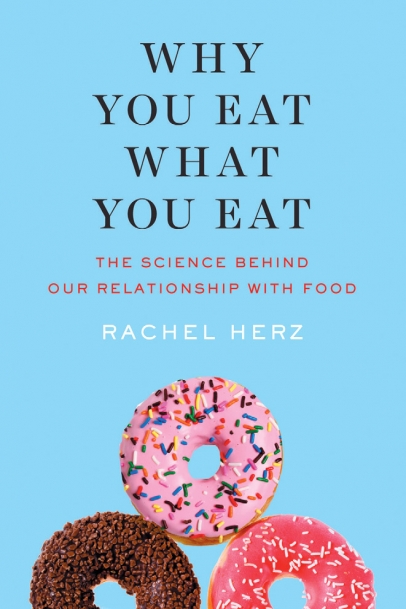Flavor, Taste and Memory
A Q&A with Rachel Herz, PhD
Rachel Herz is an olfactory scientist who takes great pleasure in the sensuality of eating. She’s spent a great deal of her life thinking about and studying the sense of smell and how smells are able to evoke powerful memory, emotion and desire in our lives. This work was the basis of her first book, The Scent of Desire (William Morrow, 2007). As a neuroscientist and faculty member at Brown University and Boston College, she continued to navigate through the entangled relationship between smell and taste, which produced her second book, That’s Disgusting (W.W. Norton & Co., 2012), which examines the root of repulsion.
Her third book, Why You Eat What You Eat (W.W. Norton & Co., 2017) looks at the factors that influence our relationship with food using a combination of scientific information about smell, taste, flavor, psychology and health that is easily digestible (no pun intended). I recently had the chance to talk with Herz about her latest book and ask a few questions about these overlapping topics.
It seems like flavor has a lot to do with smell. I think we recognize how it works emotionally, but what is the science behind it?
It is an illusion that flavor comes from the mouth. What we are sensing in our mouths are only the basic tastes: sweet, salty, bitter, sour and umami. The richness of flavor comes from our olfactory receptors in our nostrils. In actuality, aroma is what defines flavor.
Humans have an open airway between our nose and mouth so while we are chewing and breathing—inhaling and exhaling—we are activating the receptors in our nose. Because the action of chewing happens in the mouth, it appears that is where we are sensing flavor, but it’s really a response to what we smell.
If you were to pinch your nostrils and eat something, you would sense nothing but your meal’s taste (sweet, salty, bitter, sour, umami). This is why, when you have a cold and are all stuffed up, food doesn’t taste quite right.
Since you brought it up, and everyone seems to be talking about it, what is your definition of umami?
Umami is a highly debated basic taste that is often confused with salt. My definition is that it’s more a dimensionality of food. Umami brings breadth and depth to things; it makes other tastes brighter and bolder. The literal Japanese translation of umami is deliciousness.
How does smell affect the way we experience, cook and remember food?
Smell (and by default flavor) is tied to emotional memory more than any other sense, and food smells are particularly powerful and drenched in nostalgia. We can really experience autobiographical feelings and emotions when we are eating foods from our past.
What is happening is that our sense of smell activates a part of the limbic system in the brain called the amygdala, which is where emotion and emotional memory is processed. This is actually the second stop for information, after it passes through the olfactory nerve so the reaction is immediate.
The more specific the association and the less frequently we have it, the more profoundly we will experience the memory evoked by a particular smell. Like, for example, a particular dish made on a particular holiday only once a year will evoke greater emotion from its aroma than the aroma of a dish that you enjoy weekly.
The tie between smell and emotion is so strong that sometimes we don’t even know what the memory association is, but we are overcome with a feeling of warmth and goodness—or the opposite, repulsion—by a single smell. We can remain in that “feeling scape” without any clear knowledge of the content of the past experience, and this is unlike any of our other senses.
Why do people gravitate towards certain flavors and foods from birth?
A fetus’s sense of smell is fully developed at three months. (Vision can take up to three years to develop.) So, while a pregnant woman is eating, anything aromatic that she consumes enters into the amniotic fluid in her womb for her baby to smell. When the baby is ultimately brought into the world, they will naturally gravitate to whatever it was their mother ate when the baby was in utero. People of varying cultural backgrounds are primed on the aromatic profile of a cuisine well before they’ve ever eaten the foods themselves.
The more diverse a mother’s diet is, the more likely her child will enjoy a variety of foods. If you want your child to enjoy nutrient-rich foods like liver and spinach, eat them when you’re pregnant! Familiarity breeds attraction, not contempt.
So why does airplane food taste so bad?
There are two reasons. The first is that the air pressure in the cabin produces nasal congestion, which reduces the amount one is able to smell and therefore food has less flavor.
The key reason, though, is the noise. The white noise generated on an airplane reaches 80 to 90 decibels, which is comparable to standing 30 feet from a jackhammer. This noise level affects a cranial nerve that has a direct impact on how we taste, making sweet and salty less strong. Bitter and sour aren’t affected, but umami taste becomes stronger, as umami is actually heightened by the cranial nerve disruption. The experience of umami is activated by the amino acid glutamate and foods like tomatoes are very high in glutamate. This explains why so many people drink tomato juice while flying. Its taste is intensified, while lots of other foods taste worse. We could do with eating more umami and glutamate rich foods like tomatoes, mushrooms, cheese and bacon while in flight. Pizza, anyone?
What is one food you enjoy eating that has hardly anything to do with aroma?
Definitely cheese, from a sensory perspective. I love soft cheeses that are runny and gooey. I like the salty, sour and sweet tastes and appreciate them for those qualities, but it’s really the delicious creaminess and drippiness that make eating cheese so enjoyable. A lot of creamy foods have that effect on me.
For more information, visit RachelHerz.com. Her book Why You Eat What You Eat and her other titles can be purchased at your local independent bookstore and wherever books are sold.





